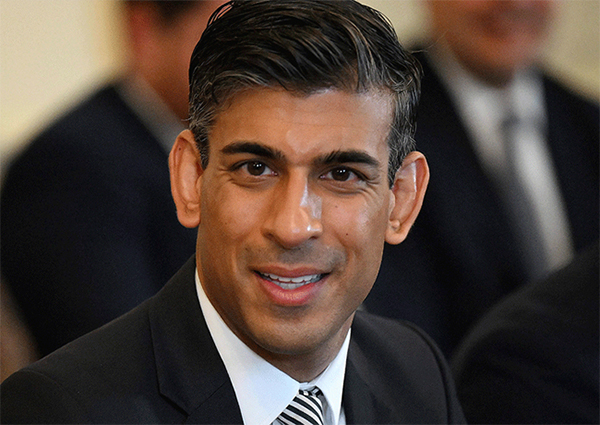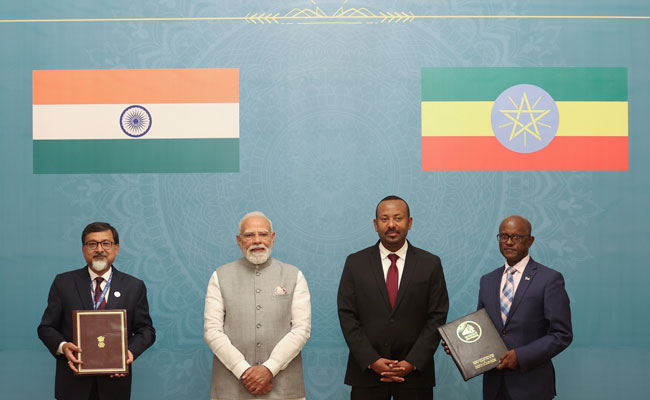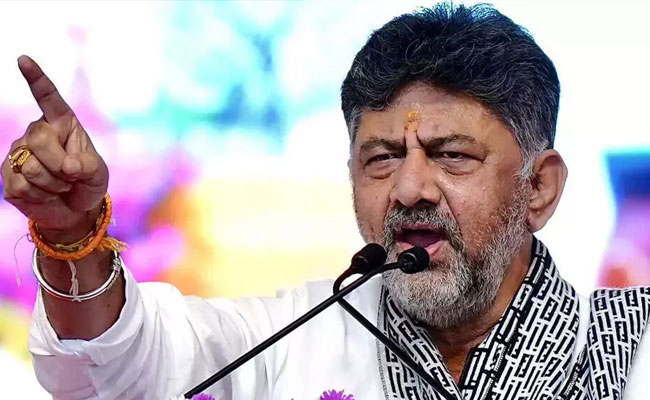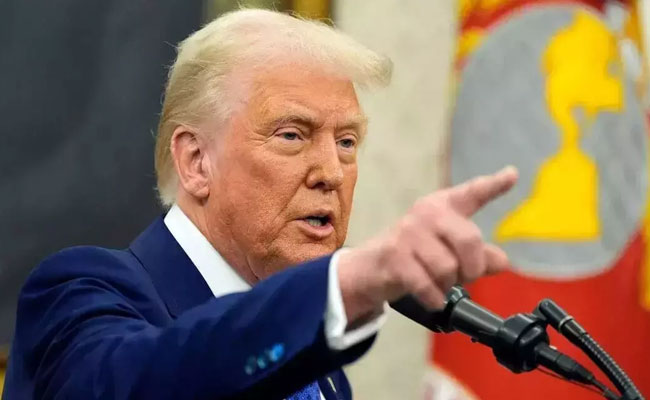London, Oct 24: Rishi Sunak on Monday is all set to make history as Britain's first Indian-origin Prime Minister after being elected unopposed as the new leader of the governing Conservative Party on Diwali, following Penny Mordaunt's withdrawal from the race.
The 42-year-old former chancellor, a devout Hindu, was comfortably in the lead, having secured the public backing of over half the 357 Tory MPs way above the 100 minimum required to make the shortlist.
In time for the 1400 local time Monday deadline, Sir Graham Brady, chair of the influential 1922 Committee of backbench MPs, announced in the Parliament complex that he had received only one nomination and therefore Sunak is the winner of the leadership contest.
This means Sunak is poised to walk through the door of 10 Downing Street in London after an audience with King Charles III in Buckingham Palace, the timeframe of which will become known soon.
Earlier, high-profile Tory MPs switched allegiance from Johnson to Sunak, including former Home Secretary Priti Patel and cabinet ministers James Cleverly and Nadhim Zahawi.
Patel, the Indian-origin former minister who resigned from the Cabinet when Liz Truss was elected the Prime Minister last month, said the Tories must put political differences aside to give Sunak the best chance of succeeding as the new leader.
Sunak's victory marks a remarkable turnaround in political fortunes for the former finance minister, who lost out to outgoing Prime Minister Liz Truss just last month after his popularity among party colleagues did not translate in the wider Tory membership vote.
Truss on Thursday announced her resignation as the Prime Minister after just 45 days in office, following an open revolt against her leadership in the Conservative Party.
The UK-born son of Indian-origin general practitioner father Yashvir and pharmacist mother Usha had spoken extensively of his migrant roots during the last campaign and also referenced making history by lighting Diwali diyas at 11 Downing Street as the first Indian-origin Chancellor of the Exchequer.
"Sixty years after my Naniji boarded a plane in East Africa, on a warm sunny evening in October, her great-grandaughters, my kids, played in the street outside our home, painted Rangoli on the doorstep, lit sparklers and diyas; had fun like so many other families on Diwali. Except the street was Downing Street, and the door was the door to No. 11," said Sunak, in his campaign video a few months ago.
That personal story also extended to a visibly emotional reference to his parents-in-law Infosys co-founder Narayana Murthy and Sudha Murthy as he hit back at attacks on his wife Akshata Murthy's family wealth.
"I'm actually incredibly proud of what my parents-in-law built," he said, during heated television debates over the past few months.
As a devout Hindu, Sunak is a regular at the temple where he was born in Southampton and his daughters, Anoushka and Krishna, are also rooted in the Indian culture.
He recently shared how Anoushka performed Kuchipudi with her classmates for the Queen's Platinum Jubilee celebrations at Westminster Abbey in June.
But beyond the personal, he also faced down attacks from his opponents over his record as Chancellor until his resignation precipitated Johnson's exit.
He stood firm on his focus on inflation rather than any vote-winning tax cut promises to woo a traditionally low-tax favouring Conservative Party membership base.
"I will get taxes down in this Parliament, but I'm going to do so responsibly. I don't cut taxes to win elections, I win elections to cut taxes," he declared.
His self-made credentials of working his way through a non-scholarship place at one of the UK's best schools, Winchester College, to a coveted Philosophy, Politics and Economics (PPE) from Oxford University and then an MBA from Stanford University as a Fulbright Scholar tick all the right boxes for the country's highest political office.
His private sector experience at Goldman Sachs and as a hedge fund manager seem to lend him the aura of someone who can be trusted in the face of harsh economic headwinds, further bolstered by his prescient warnings over Truss' unfunded tax cuts.
His political career began with winning a safe Tory seat of Richmond in Yorkshire in 2015 and from junior roles in the Treasury he was suddenly catapulted to the post of Chancellor of Exchequer when his former boss, Sajid Javid, resigned in February 2020.
Let the Truth be known. If you read VB and like VB, please be a VB Supporter and Help us deliver the Truth to one and all.
Addis Ababa (PTI): India and Ethiopia on Tuesday elevated their historical ties to a strategic partnership, as Prime Minister Narendra Modi held wide-ranging talks with his Ethiopian counterpart Abiy Ahmed Ali during which they discussed issues of bilateral and mutual interest.
Modi, who arrived here from Jordan on his maiden bilateral visit, was accorded a ceremonial welcome at the National Palace ahead of the bilateral talks, reflecting the vibrant India-Ethiopia relations rooted in shared history and a promising future.
"We are elevating India and Ethiopia relations to a strategic partnership. This step will provide new energy, new momentum and new depth to our ties," Prime Minister Modi said during the delegation-level talks.
He thanked PM Ali for his support in India's fight against terrorism. "The support of friendly countries in this struggle against terrorism holds great significance," Modi said.
"Today, we got the opportunity to deliberate on the key aspects of our cooperation, such as economy, innovation, technology, defence, health, capacity-building and multilateral cooperation. I am pleased that today, we have decided to double the student scholarship for Ethiopia in India," Modi said.
Modi said that India and Ethiopia have shared contact, dialogue, and exchange for thousands of years. The two countries, which are rich in languages and traditions, are symbols of unity in diversity, he added.
"Both countries are democratic powers committed to peace and the welfare of humanity. We are co-travellers and partners of the Global South. On international platforms, we have stood shoulder-to-shoulder," he said.
The two sides signed eight MoUs/agreements, including upgrading ties to 'Strategic Partnership', customs cooperation, establishing data center at the Ethiopian Foreign Ministry, UN Peacekeeping training cooperation, debt restructuring under G20, more ICCR scholarships and AI short courses for Ethiopians, and support for maternal and neonatal healthcare.
Modi said the African Union's headquarters in Ethiopia makes the country a meeting point of African diplomacy. "Inspired by the common vision of an inclusive world, in 2023, India ensured that the African Union became a G20 member," he said.
In 2023, during India’s G20 Presidency, the African Union was admitted as a permanent member of the G20.
Modi said that though this is his first visit, he felt a deep sense of belonging and warmth, reflecting the thousands of years of connection between the two countries.
On his part, Prime Minister Ali said the two countries share over thousands of years of connection through trade, diplomacy, education, culture and even in our food and traditions. "These ties continue to shape a deep friendship, collaboration and mutual respect between our people," he said.
"We also appreciate your consistent message that Africa's priorities must lead the partnership. These kinds of dignified, respectful messages for Africa are very important. Mr Prime Minister, keep pushing. That is the type of message we are expecting from all our trusted friends," Ali said.
He said this aligned fully with Ethiopia's development plan - African-owned, African-led, and African-defined.
"Today, we meet with a clear focus to shape a modern partnership, grounded in sovereignty, self-reliance and practical cooperation. Our cooperation is rooted in equality and South-South solidarity," he said.
"Our economy is performing strongly. Last year, we grew 9.2% and this year we are expecting 10.3% GDP growth. Besides GDP growth, our FDI inflow is also rising big time. India is the leading source for our FDI," he said.
"We have more than 615 Indian companies which are investing in Ethiopia. This all gives our cooperation a strong foundation of trust. I think our decision today that we elevate our historic relationship to a strategic relationship is the right decision," he added.
Ethiopia also conferred its highest award - The Great Honour Nishan of Ethiopia - on PM Modi. He is the first global head of state to receive this award.
Prime Minister Modi also went to the Friendship Park and Friendship Square in Addis Ababa with PM Ali.
In a warm and special gesture, PM Modi was earlier received by his Ethiopian counterpart at the airport and accorded a warm and colourful welcome.
"Ethiopia is a nation with great history and vibrant culture," Modi said.
PM Ali informed his Indian counterpart about the varieties of Ethiopian coffee during informal talks.
"At Addis Ababa airport, took part in a traditional Coffee Ceremony with Prime Minister Abiy Ahmed Ali. The ceremony beautifully highlights Ethiopia’s rich heritage," Modi said.
In a unique gesture, the Ethiopian Prime Minister drove Modi to the hotel.
On the way, he took a special initiative of taking PM Modi to the Science Museum and Friendship Park, which was not in the itinerary.
"Gratitude to Prime Minister Abiy Ahmed Ali for showing me glimpses of Ethiopian history and culture at the National Palace Museum in Addis Ababa. It was a powerful reminder of Ethiopia’s rich traditions," Modi said in a post on X.
The Nobel Peace Prize-winning Ethiopian PM’s special gestures show remarkable respect for Modi, sources said.
"Thank you Ethiopia for a welcome that was unforgettable. The Indian community showed remarkable warmth and affection. India-Ethiopia friendship is going to get even more robust in the times to come," Modi said.
When Modi arrived at the hotel, he was warmly welcomed by the members of the Indian community. Local artists performed dances. Some of them danced on the theme of the popular Hindi song 'Aisa Des Hai Mera' to welcome him.
On Wednesday, Modi will address the Joint Session of Parliament and share his thoughts on India's journey as the "Mother of Democracy" and the value that the India-Ethiopia partnership can bring to the Global South.
PM Modi arrived in Ethiopia from Jordan, where he held a one-on-one meeting with King Abdullah II at the Husseiniya Palace on Monday before the delegation-level talks.
India and Jordan also inked MoUs in the fields of culture, renewable energy, water management, digital public infrastructure and twinning arrangement between Petra and Ellora, aimed at giving a major boost to bilateral ties and friendship.
From Ethiopia, Modi will visit Oman on the final leg of this three-nation tour.





